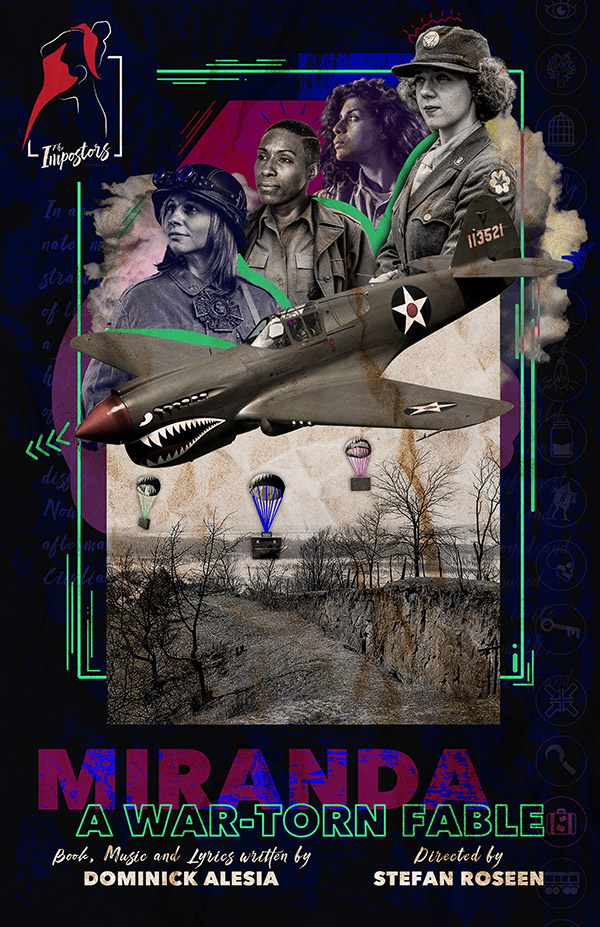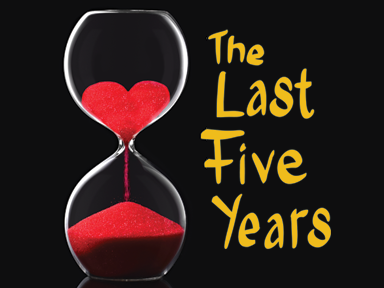
 [rating=3] “Miranda: A War-Torn Fable” is a musical and dramady produced by the Imposters Theatre Company. Written and composed by Dominick Vincent Alesia, the story fictionalizes the aftermath of World War II and personalizes what might have happened to families with little or nothing left after surviving bombings and mass destruction. The year is 1945, and the (fictional) war between Titantia and Atlica has just ended. Miranda (Kayla Higbee), who is in her twenties, is a warrior among a group of women soldiers, who fought in the war previously and are now are trying to win the peace. The scene shifts to thirteen-year-old Amelia (Carter Rose Sherman) and her parents (Victoria Olivier and Gabe Reitemeier), who have just relocated to a thrift house in their war-torn country and are trying to re-establish their lives.
[rating=3] “Miranda: A War-Torn Fable” is a musical and dramady produced by the Imposters Theatre Company. Written and composed by Dominick Vincent Alesia, the story fictionalizes the aftermath of World War II and personalizes what might have happened to families with little or nothing left after surviving bombings and mass destruction. The year is 1945, and the (fictional) war between Titantia and Atlica has just ended. Miranda (Kayla Higbee), who is in her twenties, is a warrior among a group of women soldiers, who fought in the war previously and are now are trying to win the peace. The scene shifts to thirteen-year-old Amelia (Carter Rose Sherman) and her parents (Victoria Olivier and Gabe Reitemeier), who have just relocated to a thrift house in their war-torn country and are trying to re-establish their lives.
As they move into their new digs, Amelia finds a hidden photograph of herself as a baby, being held by an older girl with some resemblance to her. When she confronts her parents about this unknown individual, they tell her that Miranda was an unhappy older sibling who left the family ten years prior. They doubt whether she has survived the war. Their conversation makes Amelia not only curious about Miranda, but she resolves to find her missing sister and bring her back home, so that their family could finally be made whole again. Although Amelia has no clue where she will go or whom she can turn to for support, the audience follows her journey wherever it takes her. In the course of her travels through Atlica, she meets up with a soldier (Ethan P. Gasbarro), who is searching for his old army buddies. The two adventurers become a team, and he makes sure to look out for her best interest.
The highlight of the show is the music, which shifts in style and complexity throughout. The dissonance is gorgeously exact when it comes to themes regarding the war and its end, while the upbeat music accompanying the various Vaudeville acts makes for a wonderful contrast. The singing is great! I loved Sherman’s and Higbee’s soprano voices. Especially splendid are the clashes among soloists, such as Olivier and Sherman as they perform in counterpoint (punctus contra punctum). Most notable is Reitemeier’s bass-baritone voice. as well as the harmonies achieved by the all-female choir/military unit, including Whitney Ann Bates, Becky Valek, Chih-Jou Cheng, and Anna Roemer. The lyrics to the songs are clever, and music director, playwright, and composer Alesia remarkably performs his original score on piano. Added to the singing is the dancing, with Roemer’s cogently developed choreography.
Unfortunately, I have mixed feelings about a generally good performance. One issue is that we have to use our imagination and picture Sherman as a thirteen-year-old. The show would have worked better had the actor playing Amelia been a lot younger. The audience finds itself scratching its collective head when Amelia meets other characters (such as those played by Eric Desnoyers and Sam Martin) and they refer to her tender age. It is also unclear about why there are separate armies of men and women, who have previously fought together as allies on the same side. Perhaps this gendered duality is actually a setup for the divide between comedy and drama in this show. In other words, the brawniness and seriousness of the women in their dramatic roles is contrasted with the softness and silliness of the men in their comedic roles. Although the humor is generally lighthearted and funny, the bits occasionally descend into being a bit too sappy for my taste.
Furthermore, the script is uneven and the show is too long. The first act is 1-1/2 hours and after a 15-minute break, the second act is an additional hour. Thirty to forty-five minutes of the show can easily be cut; this would make the story sharper. To my mind, Amelia’s journey in the first act needs to be trimmed, such that the midpoint (intermission) is a bit closer to the middle of the performance. One way to shorten the show is to entirely remove the subplot about the unopened suitcase and its contents. Then too, the introduction of the subplot about the ghoulish family in the second act adds a horror dimension that is terribly unnecessary. I would have preferred a somewhat lighter story, considering that this is supposed to be a fable. That sad, I liked the message of last song very much: that it’s often not what you accomplish or not accomplish in life, but it’s the journey that counts. The ending would have been much stronger and far more interesting had there been no missive at all. If its author would have disclosed this content face-to-face in person at the end of the story, the bookends of the plot would have worked so much better!
The directing by Stefan Roseen nicely moves the action from one location from the next and from one scene to the next. I liked the novel idea of the painted wooden plank to represent a man who is dying. One of my favorite aspects of the show is creatively using tree branches to comprise the forest as well as showing trees in shadow, which is part of lighting director Mallory Swisher’s purview. Considering the destruction inherent to the story, the sparseness of the set is perfectly appropriate, thanks to the work of master carpenter James Eric Roseen and props artisans Jackie Bobbitt and Levi Crouch. Costume designer Kayla Belec has created a huge variety of apparel, from mid-1940s outfits to military fatigues, plus clownlike outfits worn by the male soldiers. Hair and makeup by Victor Lopez is suitably done. Costume and wig changes are ample, and there are mask changes too.
In brief, this “coming-of-age” story about the adventures of a young girl takes its inspiration from “The Wizard of Oz” and “Alice in Wonderland.” In addition to being a journey through a mythical war-torn country, it is a journey of the mind and heart as well. For me, the story ought to be more tightly framed around a basic question: How do you ever get over the existence of war and its destructive effects on one’s life and that of one’s family? The characters in this show each have different ideas on how to survive and how to build or rebuild a future that may or may not have been promised. But it is when both women acquire the maturity to move on with their lives that the show hits its high point.
“Miranda: A War-Torn Fable” is playing through March 4, 2023 at the Den Theatre, 1331 N. Milwaukee Avenue, in Chicago’s Wicker Park neighborhood.
General Admission Tickets: $21 (plus a $5 convenience fee)
Special Reserve Tickets: $25 (plus a $5 convenience fee). These must be purchased online.
Performance Schedule: The remaining performances on Thursday, March 2; Wednesday, March 3; and Friday, March 4 are at 8:00 p.m.
For more information about this show or to purchase tickets, please go to: https://thedentheatre.com/performances/2023/2/17/miranda-war-torn-fable-the-den-theatre or call 773-697-3830.
You may also purchase tickets at the Den Theatre box office.
Discounted tickets and special offers are available for groups of 10 or more.
Please contact: impostorstheatre.boxoffice@gmail.com.
For more information about the Impostors Theatre Company and to learn about their other offerings, visit: https://www.theimpostorstheatre.com/.
For more information about offerings at the Den Theatre and to purchase tickets, see: https://thedentheatre.com/den-theatre-tickets.
COVID-19 Protocols: Vaccination is no longer required to attend performances at The Den Theatre, although wearing masks is strongly encouraged. The Den Theatre continues to follow the guidelines recommended by Chicago Department of Public Health and CDC Community Risk Levels as outlined in the City of Chicago COVID dashboard. Requirements may change at any time.
To see what others are saying, visit www.theatreinchicago.com, go to Review Round-Up and click at “Miranda:A War-Torn Fable”.






More Stories
“The Firebugs” reviewed by Julia W. Rath
“The Book of Grace” Al Bresloff with another from Paul LIsnek
“The Last Five Years” MILWAUKEE